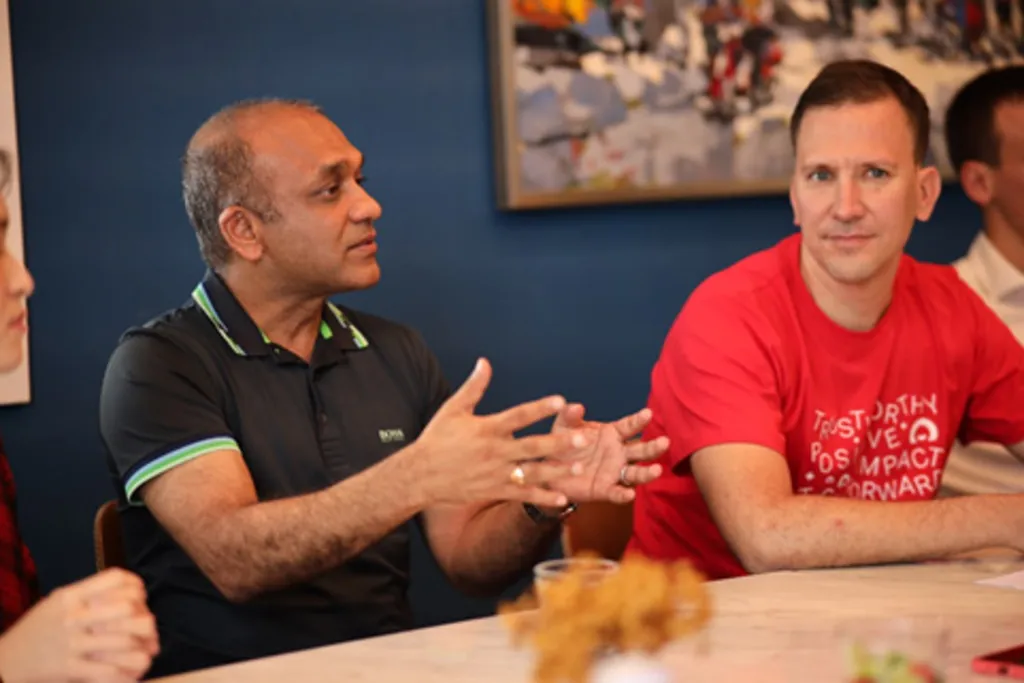 Brandinfo
Brandinfo

Home Credit, one of the first consumer credit companies in Viet Nam, has focused on ESG targets for a long time. In addition to bringing the best services and products to Vietnamese customers, Home Credit has organised many programmes in Viet Nam and worldwide to improve customers’ financial literacy.
Every year, the company spends half its marketing budget on ESG, including organising courses about financial literacy, benefiting millions of customers.
Jan Ruzicka, Home Credit’s Chief External Affairs Officer, and Dr Sumit Agarwal, Professor of Finance, Economics and Real Estate at the National University of Singapore, shared their perspectives on improving financial literacy for sustainable development in Viet Nam.
How do you assess the current level of financial literacy in Viet Nam, and how important is improving financial literacy?
Dr Sumit Agarwal: In Viet Nam, the situation is very similar to other Asian countries, including China, the Philippines, Indonesia, and India. There are two sets of people: people from urban and rural areas. Big banks always cherish customers from the big cities because they are more educated, and loans are less risky. Geographically, the banks do not go into the countryside. Therefore, there is a different level of financial literacy in rural areas.
Digitalisation and FinTech have changed everything by bringing financial services to the masses. People are becoming educated about super-apps and payment gateways.
Right now, most consumers are dealing with finance digitally. Therefore, they need to have digital literacy as there is a lot of fraud and manipulation by third parties who have realised that many financially illiterate people are trying to access finance digitally.
This includes women or very young or very old people who are both visually illiterate and financially illiterate. Getting them to become both financially and digitally literate is, therefore, very important.
 |
| Dr Sumit Agarwal discusses financial literacy during the meeting |
{ "id": "S9B9CpAbvc", "type": "myToolImages", "data": { "data": "" } }
Jan Ruzicka: Everything is much more digitalised. Smartphones and the internet have changed financial services. The development of FinTech is also a great channel to bring more information to the people.
In the end, we need to think about customers who are not financially savvy because there are a lot of fraudsters and bad guys online.
What has Home Credit done to help customers improve financial literacy, especially in Viet Nam?
Jan Ruzicka: At Home Credit, we have been conducting financial literacy programmes for over 20 years. Every year, our courses reach over 100 million people.
For example, we advise on new FinTech regulations and customer protection.
In Viet Nam, we have frequent discussions with the State Bank of Viet Nam, the Ministry of Finance, and other organisations like the Vietnam Women’s Union about various topics, including financial literacy, FinTech regulation, ESG and sustainability.
Half of our marketing budget is spent on ESG, including financial literacy programmes in Viet Nam annually.
 |
| Home Credit partners with VTV3’s “Clever Money” series to improve viewers’ financial knowledge and literacy |
{ "id": "ssMb5JKSUf", "type": "myToolImages", "data": { "data": "" } }
Years ago, of course, everything was offline. We sent printed textbooks and volunteers to rural areas and villages across Viet Nam to educate children in schools or farmers who did not have much information about financial services.
Now everything is more digitalised. We have given people information on how to protect themselves in diverse and entertaining ways, such as using influencers, making TikTok videos, or creating mobile games.
We are even preparing to make financial literacy an organic part of the customer journey.
We also believe financial literacy and inclusion are key to our sustainability and ESG. Why? We are not an oil and gas or manufacturing company, so it is not our task to fight climate change. Our task is to protect customers by giving them the know-how and credible, safe service. And that is why we are collaborating with Professor Agarwal and the National University of Singapore to bring innovative ways of delivering information to people in Viet Nam.
Professor Agarwal, please tell us why you chose to work with Home Credit.
Dr Sumit Agarwal: Regarding sustainability, I care about individuals and households. Household sustainability is a concept in which households should be sustainable from an environmental point of view, social point of view, and financial point of view. It is good if households are financially sustainable, but they must also be environmentally and socially sustainable.
From working with Home Credit, I found that my perspective aligns with theirs, which is why we decided to cooperate. We aim to make households both financially and socially sustainable. I think social sustainability is about intergenerational sustainability.
But you cannot achieve social or environmental sustainability without financial sustainability. In finance, as we have learned over generations and as I teach to my students, access to credit is key to household financial sustainability and a country’s economic sustainability.
But typically, finance companies worldwide have only cared about profits over the last 50 years. Most finance companies think about how to maximise returns. So it was refreshing when I spoke to the Home Credit team for the first time, and they said they cared about financial literacy. I was puzzled. Why does a company - a private credit-providing company - want to educate their consumers? I have been working with them, and they want to educate me. It is in their interest to educate.
Therefore, we have partnered with them to educate a wide array of consumers. Home Credit is fully aware that when consumers are educated, some will leave because they will realise that they do not want FinTech loans; they want traditional bank loans because they can get better credit.
So why would Home Credit still do that? Because they are creating a long-term relationship with the consumer. Once consumers trust the company, they will stay with them.
Who will benefit from Home Credit’s financial literacy programmes?
Jan Ruzicka: We are trying to focus on people unserved by traditional banks, including farmers, women, and vulnerable people. That is why we work with education departments all around Asia.
We also focus on children to teach them the basic ideas of money, finance, and responsibility. We provide online and offline courses as some people are still unfamiliar with digital communication.
 |
| Jan Ruzicka, Chief External Affairs Officer of Home Credit Group, discusses the financial literacy programmes at Home Credit |
{ "id": "CqioVfRRV0", "type": "myToolImages", "data": { "data": "" } }
{ "id": "4n8IzFu85X", "type": "myToolImages", "data": { "data": "" } }
Around the world, every year, 100 million people access financial literacy programmes, but how many of them really understand spending and financial management?
Jan Ruzicka: This is an ongoing process, not a one-time course. You need to work with people repeatedly. A single course is not enough because people will forget important details, so you need to repeat the process again and again for people to gain a real understanding and be confident in their knowledge.
Not all 100 million are active customers, but they are our base. We talk about over 100 million educated people because we really want to increase their knowledge and understanding. It is also good business because increasing financial literacy reduces our non-performing loans.
Dr. Sumit Agarwal: Let me try to put this in perspective. I have been working with banks for over 20 years. It is not in banks’ interests to provide financial literacy courses, as it hurts their bottom line. You are really asking two things. Are they doing financial literacy? And do they measure the impacts of financial literacy on their customers?
Doing the first is easy. Most companies will say they are throwing money at the wall or making another offensive statement. Doing the second is very hard. And Home Credit is just starting to do the second, measuring the impacts of their financial literacy programmes, how customers are benefiting, and how social welfare is improving. I do not know of any other financial company anywhere in the world which is doing that.




